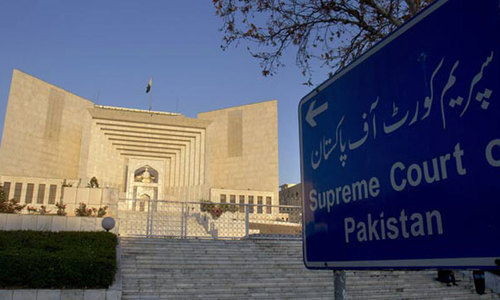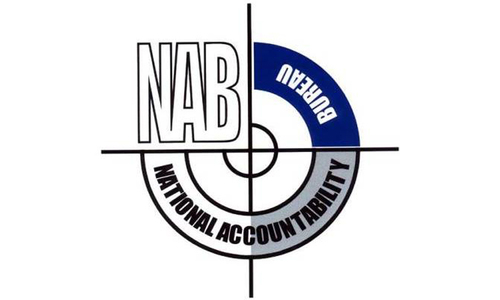Continuing his arguments before the Supreme Court's (SC) five-member bench hearing the Panamagate case on Wednesday, Attorney General (AG) Ashtar Ausaf Ali pleaded that the Hudaibiya Paper Mills reference against the Sharif family not be linked with the Panama Papers case as it differs in nature and substance.
When the bench had asked the AG on Tuesday if the court should intervene in the Hudaibiya case, Ali had argued that it would set the 'wrong' precedent if the SC issues an order in the case.
The Hudaibiya Paper Mills reference was initiated on the basis of a confession recorded by Finance Minister Ishaq Dar on April 25, 2000, wherein he conceded that he had played a role in laundering roughly Rs1.2 billion on behalf of the Sharifs through fictitious accounts.
The AG told the bench that the case record in the Hudaibiya reference had been examined and that the company had obtained loans through foreign currency accounts.
At this, Justice Saeed expressed the bench's frustration by saying that the lawyers were issuing different statements each time, which was confusing the bench.
"If a story has been made up, you should stick to it," he remarked.
"The court was told that investments had been made in the Qatari [royal family's] businesses. There was no mention of foreign currency accounts in the repayment of loans."
Addressing the AG, Justice Saeed said: "You should argue as the attorney general. Don't become a party [to the case]."
When the AG insisted that the Hudaibiya and Panama Papers cases should not be linked, Justice Saeed asked him why he was shying from the Hudaibiya case if the allegations in the case were false.
"[And] if the are allegations are true, why was the case buried?" he asked.
Justice Saeed further commented that the National Accountability Bureau (NAB) had "died in front of us yesterday".
On Tuesday, the apex court had been frustrated by the apparent stubbornness of the heads of NAB and the Federal Board of Revenue (FBR), who stood their ground when grilled on actions taken against the Sharif family and those initiated in the wake of the Panama Papers leaks.
NAB Chairman Qamar Zaman Chaudhry had reiterated his earlier decision to not reopen money laundering references against the Sharifs, which implicated the prime minister along with other members of his family.
Continuing his arguments about NAB's failure to file an appeal before the Supreme Court on the re-opening of the Hudaibiya Paper Mills reference, the AG said: "Anyone could have filed an appeal against the court decision".
When Justice Ejaz Afzal Khan pointed out that the right to appeal was reserved for the affected party, the AG said there was no such thing in the constitution.
'Reference could be filed for PM's disqualification'
The matter of Prime Minister Nawaz Sharif's disqualification was also part of the hearing, with Justice Saeed stressing that "it is the right of every citizen [to know] whether their premier is qualified or not".
The issue is about Sharif's disqualification as a member of the National Assembly, not as the prime minister, the AG responded.
Justice Asif Saeed Khosa, who heads the bench, said the court had already declared that petitions seeking disqualification of the prime minister constituted a case of public importance.
Read: Disqualification of PM is a matter of public interest: SC
The bench asked Ali to assist the SC to "the extent the court can go to" regarding the premier's disqualification.
To which, the AG said a disqualification reference could be sent to the NA speaker. In case of the speaker failing to decide on the matter, another forum could be approached, he said.
"We have said on multiple occasions that if other institutions do not do their jobs, the court can intervene," remarked Justice Saeed.
The court had declared in the case of ex-PM Yousuf Raza Gilani that the prime minister "can be sent home", said Justice Saeed.
Justice Khosa also asked the AG what issues could arise if a reference is filed for the disqualification of Sharif, who is also an MNA.
The AG responded that the procedure for an MNA's disqualification is written in the constitution, adding that an MNA is not a public office holder hence the writ of quo warranto may not be relevant.
'PM does not have immunity under CrPC cases'
The AG said every public representative is required to submit details of their assets.
If the assets are concealed or misstated, he explained, a trial is held in a sessions court. The conviction entails a three-year jail term and Rs5,000 fine or both.
"Are you suggesting that the petitioners file a case against the prime minister under the Code of Criminal Procedure (CrPC)?" Justice Saeed asked.
The AG replied in the affirmative, saying "the prime minister does not have immunity in CrPC cases under the constitution".
Justice Khosa then asked the AG whether the sessions judge will be able to solve the matter in such a trial.
"Who will prosecute, who will bring the witnesses?" he asked.
Justice Saeed remarked that after NAB's response, the prospect of an investigation against the prime minister "has been buried six feet deep in the ground".
Justice Khosa regretted that no one is cooperating with the court, and that "information is not being provided".
The hearing was subsequently adjourned till Thursday, when Pakistan Tehreek-i-Insaf's (PTI) counsel Naeem Bokhari will present his closing arguments.













































